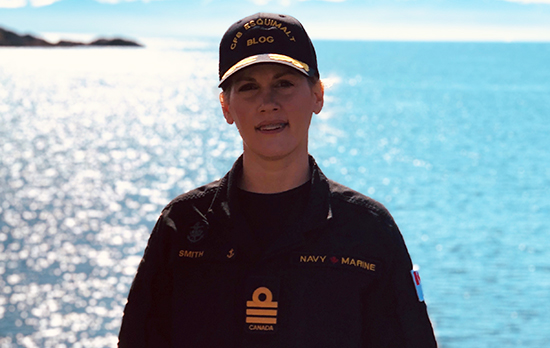The Profession of Arms in Profile – The Royal Canadian Logistics Service: Cdr Cynthia Smith - Commanding Officer, Base Logistics HQ, CFB Esquimalt
March 15, 2021 - Defence Stories


Caption
Cdr Cynthia Smith - Commanding Officer, Base Logistics HQ, CFB Esquimalt
As part of our commitment to share Defence stories beyond any particular day, The Maple Leaf will profile several women leaders across the CAF, specifically those in the Royal Canadian Logistics Service (RCLS). We will share their example, their experience and celebrate their tireless support to international and domestic operations, exercises, and the day-to-day business of the Canadian Armed Forces.
Read about others profiled in this series, including:
- Commander Selena Aral, Commanding Officer, Base Logistics HQ, CFB Halifax
- LCol Amanda Aldous – Commanding Officer, 17 Mission Support Squadron, 17 Wing Winnipeg
Cdr Cynthia Smith began her CAF career at the Royal Military College of Canada, where she had been accepted as a military engineer. After her recruit term, however, she sought out a new path as a naval logistics officer.
The logistics profession appealed to two aspects of Cdr Smith’s personality. The first was the financial and resource management part of the job; she describes being analytical and meticulous as something that centres her “almost as much as the ocean.” The second aspect was the way in which logisticians need to bring people together – whether it’s people in the units she supported, people in the supply chain, or international vendors. The need to build and strengthen these relationships provided a strong sense of connection, as well as a surprising degree of agency.
“That’s what we have to do as logisticians,” Cdr Smith says. “It really does fall to us, even starting as a young age going into foreign ports – it’s all departments I’m liaising with, to ensure we get all the services we need when we get in there. Plus I was liaising with port authorities, with our agents on the ground, plus so many contractors. And it’s up to us to make those connections – we are the spokesperson for the ship.”
Cdr Smith’s experience in other units holds true to this example, including the most effects-focused operational units of the CAF. She cites her experience providing logistics support to CANSOFCOM tactical units, during which her lieutenant colonel empowered her by simply trusting her to do her job.
“I was speaking to ministers of foreign affairs in different countries on his behalf,” she notes. “And taking care of any diplomatic issues, facilitating entry into countries. And I was trusted to do so. So we’re giving a lot of responsibility to junior logisticians, and that was only at the naval lieutenant rank when I went overseas with CANSOFCOM. They trust us.”
As a commanding officer, Cdr Smith now has the opportunity to provide that same level of trust to her team. “Now what I say to my folks is I’ll treat them like adults, I empower them to make decisions, and I’m not in their shorts,” she says. “I’ll get decision briefs, sure, but for lower-level decisions I’ve delegated down. They keep me informed, I’m lockstep with them, and I have their backs. And they know it.”
A great deal of Cdr Smith’s effort has been focused on improving the culture within her command. As she walked through her lines and got to know her people, she focused on practicing active listening – devoting her full attention to absorbing what people were saying, rather than trying to brainstorm solutions to problems in the moment. This has helped her truly understand the underlying concerns people have.
“Don’t try to solve all their problems, ask them questions,” she advises. “Apply your mentorship skills – sit down with them to figure out why people don’t feel they fit in. And then after that, figure out what we can do to break down those barriers.”
Cdr Smith’s own experience has shaped her approach to these cultural problems. While on the Joint Command and Staff Programme in 2013/14, she was in a group with three international officers – all men, all operators. In the first week, she was tasked with leading a discussion on CANSOFCOM, because she was the only one in the group with experience in a special forces unit. As weeks went on, however, the allied officers continued to ask questions about CANSOFCOM that had already been covered by her presentation. When another classmate pointed this out, their response surprised her.
“Their point of view was that because I was a supporter, I was a young female, and navy, they didn’t want to listen to me because they didn’t think I had the right perspective,” she says. “I didn’t like the way that felt, when people weren’t listening to me and not valuing my opinion.”
Cdr Smith spent time trying to understand their perspective, and adapt her style, but ultimately sought out her former executive officer aboard HMCS Calgary to express her frustration and seek advice.
“I said to him, ‘Sir, I don’t belong in the Forces. I don’t think the same way, I don’t have the same perspective, and I don’t think they’re adding value because no one is listening,’” she says. “And he said to me, ‘That’s why we need you.’ And that’s stuck with me since 2013… we’re not there yet, but with openness and acceptance, we will get better.”